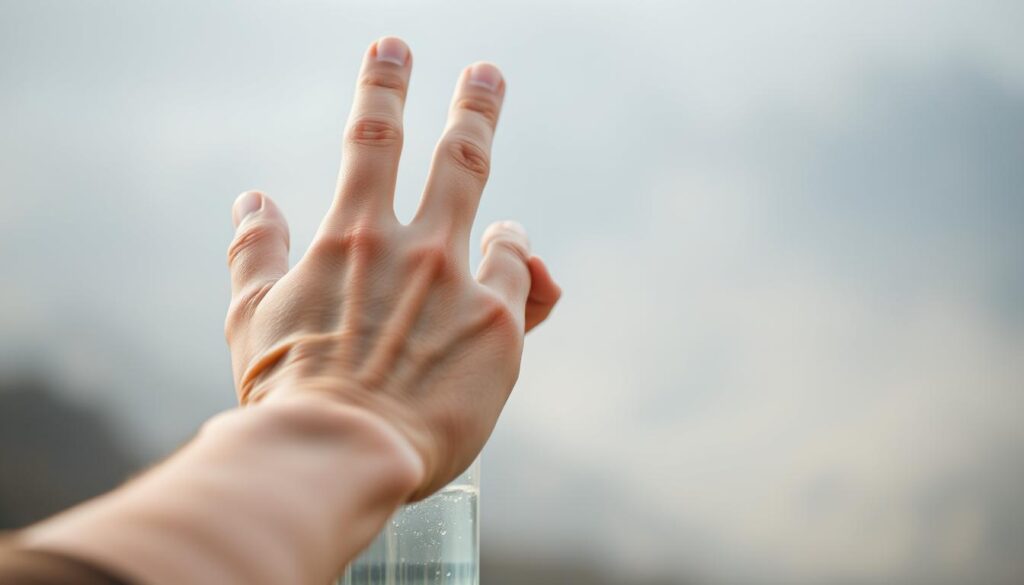Staying hydrated is key to keeping muscles healthy and speeding up recovery. It’s really important for athletes who push their limits. Drinking enough water boosts athletic skills and helps avoid injuries. Our bodies need water to work well, especially our muscles.
Not drinking enough can cause muscle cramps, tiredness, and less energy during sports, making recovery slower. This shows why it’s important for athletes to know how hydration affects their health and skills.
Understanding the Importance of Hydration
Staying hydrated is key for your health and how well you perform. About 60% of our bodies are water. This liquid is vital for regulating our temperature, how our body works, and our metabolism.
Since water is found more in some parts of the body than others, it’s important for everyone to understand hydration. This is especially true for athletes who want to be at their best.
Overview of Body Water Composition
Our bodies are complex, and water isn’t spread out evenly. Muscles have more water than fat, which is why staying hydrated is important for muscle work and recovery. Being well-hydrated helps cells move nutrients around and get rid of waste properly.
When you drink enough water, your energy levels stay up. This helps you do better during exercise.
Effects of Dehydration on the Body
Dehydration happens when you don’t drink enough to meet your body’s needs. Not having enough water can hurt how your body functions and lead to health problems. Signs of dehydration include less stamina, more muscle pain, and trouble thinking clearly.
Athletes might see their performance drop, as even a little dehydration can slow down recovery and effectiveness. Making sure to drink enough water can avoid these issues. It helps with steady training and being the best athlete you can be.
Signs of Dehydration in Athletes
Recognizing dehydration signs is key for athletes wanting to stay at their best. Knowing signs of losing fluids helps spot dehydration early. This condition shows in many ways during training and competitions.
Common Symptoms of Dehydration
Many signs of dehydration can hurt an athlete’s ability to perform. It’s important to look out for symptoms like:
- Increased thirst
- Dry mouth
- Fatigue
- Dizziness
- Muscle cramps
- Lightheadedness
- Darker urine
How Dehydration Affects Performance
Studies show dehydration negatively affects athletes. Even a little bit can make you react slower and cut down your stamina. It can also mess with your brain, making it hard to make quick decisions. During intense activities, athletes might lose lots of fluid, sometimes 2 quarts every hour. So, keeping hydrated is crucial for doing your best.
How Hydration Influences Muscle Health
Hydration is key to keeping muscles healthy and working well. It helps muscles get the nutrients they need and stay smooth. For athletes, staying hydrated is a must to perform their best. Not drinking enough water can lower your ability to perform and slow down muscle recovery.
The Connection Between Hydration and Muscle Function
Being well-hydrated helps your muscles contract strongly. Hydration aids in:
- Maintaining blood volume for effective nutrient delivery
- Supporting joint lubrication to reduce friction
- Regulating body temperature during physical exertion
If you don’t drink enough water, you might get muscle cramps and feel tired quicker. This can make your performance suffer.
Impact of Dehydration on Muscle Recovery
Not drinking enough water can make muscle recovery harder. It can lead to more soreness and longer recovery time. Losing even a small amount of water—about 2% of your body weight—can hurt your recovery and how well you perform.
Athletes should drink plenty of fluids after working out. This helps muscles heal faster and prepares you for more exercise.
The Role of Electrolytes in Hydration
Electrolytes are vital for keeping hydration in check, especially for athletes. These minerals include sodium, potassium, calcium, and magnesium. They not only help with fluid balance but also aid in nerve and muscle functions. Knowing how they work can greatly improve athletic performance.
What Are Electrolytes?
Electrolytes are key minerals in our body fluids. They manage important body functions and connect hydration to overall health. During intense exercise, athletes lose electrolytes through sweat. It’s crucial to replace these minerals to keep the body’s hydration balanced. This helps in achieving the best performance and recovery.
Importance of Electrolyte Balance for Athletes
For athletes, keeping the right balance of electrolytes is essential. It’s especially important during long events or activities. If electrolyte levels drop too low, athletes might face muscle cramps, tiredness, and poor coordination. There are several ways athletes can maintain this balance:
- Drinking sports drinks or beverages with added electrolytes
- Keeping track of electrolyte levels before, during, and after exercising
- Knowing their unique hydration needs, depending on how intense or long their activities are
Recommendations for Daily Water Intake
Staying well-hydrated is key for keeping healthy. This is even more critical for athletes who do intense workouts. They are advised to drink half their body weight in ounces of water every day.
Guidelines for Athletes and Active Individuals
Athletes need more water because they sweat a lot and use more energy. Depending on how active they are, the weather, and how much they sweat, they might have to drink more water. Before exercising, they should drink 500 to 600 ml of water to stay hydrated and perform best.
Adjusting Intake Based on Activity Level
How much water you need changes with how much you move. People who work out hard or are outside in the heat need to drink more. Keep drinking water while you exercise to keep up your performance and hydration. Paying attention to how thirsty you are can help you stay well hydrated.
Hydration Strategies Before, During, and After Exercise
Staying hydrated is key for athletes to boost their performance and speed up recovery. Using the right hydration strategies can greatly improve how you work out and feel. To be at their best, athletes must ensure they’re well-hydrated during all training phases.
Pre-Exercise Hydration Tips
Getting hydrated well before starting exercise is crucial. It prepares your body for the physical stress ahead. Here’s what you can do:
- Drink about 16-20 ounces of water 2-3 hours before exercising.
- Have another 8-10 ounces roughly 20-30 minutes before you begin.
- For longer or tougher sessions, think about drinks with electrolytes.
Strategies for Hydration During Workouts
Keeping up with hydration helps avoid the drop in performance that comes from dehydration. Proper hydration tactics during your workout are key. Stick to these tips while exercising:
- Try drinking 200-300 ml of fluids every 10-20 minutes during your workout.
- If you’re thirsty, don’t wait, drink up.
- For long or hot workouts, go for fluids that have electrolytes.
Hydration and Muscle Recovery Post-Exercise
Staying hydrated is crucial for muscle recovery after working out. Intense training leads to a lot of fluid loss. So, it’s important to drink up after exercise to restore this balance. Drinking water and electrolyte-filled drinks helps meet the body’s needs after hard work. These steps are key for less muscle pain and quicker recovery.
The Importance of Rehydrating After Activity
Your body needs to replace fluids lost during a workout for proper muscle recovery. Without enough water, recovery slows, and injury risks go up. Good hydration after working out helps:
- Flush out toxins from exercise.
- Bring important nutrients for muscle fixing.
- Keep body temperature in check.
Effective Methods for Recovery Hydration
How you choose to rehydrate can have a big impact on muscle healing. Consider these tips:
- Drink water: It’s the easiest and best way to get fluids back.
- Consume sports drinks: These give you electrolytes to balance fluids.
- Include moisture-rich foods: Eating fruits like watermelon and oranges gives both water and nutrients.
By following these strategies, your body stays hydrated better. This means you’ll recover more efficiently after physical activity.
The Science Behind Hydration Timing
Timing is key for muscle health and athletic performance. Proper hydration timing means athletes make the most of their water intake around workouts. A well-made drink schedule for before, during, and after exercise boosts recovery and performance.
How Timing Affects Muscle Health
A hydration schedule can change the game for athletes. Studies show that drinking fluids at set times boosts muscle performance. Staying hydrated keeps muscles from cramping and getting tired, linking hydration timing and muscle health closely.
Athletes who hydrate well may see better endurance and less soreness. This lets them train more intensely and bounce back quicker.
Developing a Hydration Schedule for Training
To make a good hydration plan, consider your workout needs. Aim to drink water all day, focusing on these times:
- Before Exercise: Start drinking water several hours before exercise to get muscles ready.
- During Exercise: Keep drinking during your workout to replace any fluids you lose and keep performance up.
- After Exercise: Hydrate right after training to help with recovery and ready the body for next time.
This hydration plan not only helps with muscle health but also drives success in sports through better performance and faster recovery.
The Impact of Hydration on Injury Prevention
Hydration is key to avoiding injuries for athletes. Not drinking enough water affects muscles and raises injury risks. Without enough water, you might face cramps, strains, or other injuries. This shows why it’s important to drink plenty of water for good athletic performance.
Dehydration as a Risk Factor for Injury
It’s important to know how not drinking enough affects your performance and can lead to injury. Without enough fluids, your body struggles with temperature control and moving nutrients around. You might face:
- Impaired muscle coordination
- Heat exhaustion
- Increased susceptibility to cramps
These issues can make injuries more likely, so athletes must understand how vital water is. By keeping an eye on how much they drink, athletes can cut down their risk of these problems. This helps whether they’re playing a game or practicing.
Maintaining Hydration to Avoid Musculoskeletal Issues
Staying hydrated is crucial for keeping your muscles and joints healthy. It helps your body handle the impact of activities that are hard on your body. Athletes can follow these tips:
- Set hydration goals based on individual needs.
- Watch how much you drink before, during, and after working out.
- Drink fluids with electrolytes if needed.
Following these steps not only boosts performance but also helps prevent injuries. This protects you from injuries caused by not drinking enough water.

Common Myths About Hydration
Many people think thirst tells you when it’s time to drink water. This isn’t always true, especially for athletes. They might not notice they’re getting dehydrated until it hurts their ability to perform. It’s key to understand the truth about hydration for good health and better athletic results.
Dismantling Misconceptions
There are lots of false beliefs about staying hydrated. One is that only drinking water keeps you hydrated. But drinks like sports beverages and even some foods help, too. Another wrong idea is thinking you need less to drink in cold weather. However, you can get dehydrated no matter the temperature, especially when being active.
Understanding Thirst and Hydration Needs
The link between feeling thirsty and needing water is often misunderstood. Some athletes wait until they’re thirsty to drink. But thirst might mean they’re already a bit dehydrated. It’s better to keep an eye on how much water you’re drinking during the day, not just when you’re thirsty. Knowing the truth about hydration can improve both health and how well you perform.
Conclusion
Staying properly hydrated is key for the health of muscles and the well-being of athletes. Not drinking enough water can greatly affect how well athletes perform. It can also slow down recovery and make injuries more likely.
Athletes need to make sure they drink enough fluids. They should know the signs of not having enough water. This ensures they always perform their best.
Having a good plan for drinking water before, during, and after exercise is crucial. Understanding how important water is and consistently drinking enough can help athletes do better. They can recover faster and have fewer chances of getting hurt.
Taking care of hydration supports muscle health and makes an athlete’s training last longer and be more effective. Making sure to focus on hydration is essential. It helps athletes achieve their top performance in their sports.



